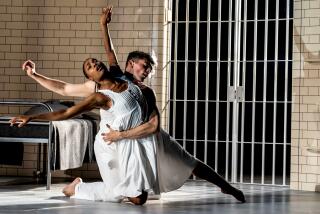Bravura, but ...
- Share via
An essay in the Dance Research Journal last summer defined Israeli dance in terms of nervous energy: “unstable form, constantly negotiated space, people made vulnerable in their attempts to fix space, bodies that constantly undermine themselves.” No better illustration of that analysis has reached local stages recently than the three pieces created by Israeli-born, Philadelphia-based choreographer Ronen Koresh and seen at the Cerritos Center on Saturday.
Contemporary in style and sophisticated in technique, the Koresh Dance Company specialized in drastic momentary contrasts: feelgood audience-courting versus sullen dance-for- its-own-sake; balletic limb-driven action versus modernist torso moves; restless extremes of high and low, slow and fast, introspection and display.
One male quartet in his “Twisted Pleasures” (2003, music by John Vosbikian) featured quick changes from prosaic jogging to self-important strutting, arrogant posing, a kind of shimmering, winged surge and a tight, side-by-side approximation of the cygnets from “Swan Lake.” But all this unstable form -- including the passages in which partners were swiftly chosen and discarded -- did make the dancers undermine themselves. Intended as a celebration of uninhibited instinct, “Twisted Pleasures” emerged as an aggressive bravura showpiece in which all the expressions of instinct looked very inhibited indeed: imposed and cued in an attempt to win approval.
A seductive solo for the accomplished Melissa Rector -- alone on a stage full of couples -- overtly dramatized this strategy, and it also dominated “Backtracks” (2002, music by Daniel Bacon), an abstraction of the company’s evolution. Beginning with the dancers in twitchy, feisty isolation, it suddenly teemed with smiling camaraderie and sharp unisons projected in the audience’s teeth. The company looked sensational here, but the overwhelming pileup of ideas and effects created a sense of deep vulnerability: an afterimage of someone hiding behind his considerable creative assets and never daring to be himself.
Commissioned by the Cerritos Center, Koresh’s new, apocalyptic “Judgment” (music by Vosbikian) showed him at his best and worst. Boasting brilliant performances by Travis Mesman and Dougie Styles, the piece contained what may have been the most powerful dance depiction of Christ’s passion and death yet seen on a local stage. The Christian iconography was familiar, but the expression and performances proved fresh, urgent and deeply persuasive.
Unfortunately, this extraordinary achievement soon became dulled by a video cavalcade of 20th century villains (Hitler, Mao, Stalin, the Klan, plus terrorist explosions and a cascade of dollar bills), followed by a puerile, overextended narrative involving Rector’s misadventures with an attache case.
Koresh needs to rethink or even junk this glib portrayal of contemporary poverty and materialism in favor of something more personal and penetrating. He is very, very talented, but his voyage of artistic self-discovery has just left the starting gate, and his knack for entertaining an audience with choreographic fireworks is, at the moment, far more visible than the qualities that made him an artist to begin with.
More to Read
The biggest entertainment stories
Get our big stories about Hollywood, film, television, music, arts, culture and more right in your inbox as soon as they publish.
You may occasionally receive promotional content from the Los Angeles Times.










